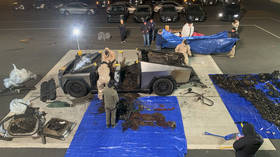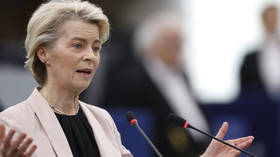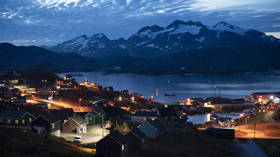Balkan government toppled in no-confidence vote

The parliament of Montenegro passed a no-confidence motion on the government of Prime Minister Dritan Abazovic on Saturday. With his premiership ending after just four months, Abazovic was the shortest-serving leader since Montenegro’s independence from Serbia in 2006.
After a 12-hour sitting of parliament that began on Friday, 50 out of 81 MPs voted against Abazovic’s coalition government, ending his tenure as prime minister.
The vote was called by the Democratic Party of Socialists (DPS) of President Milo Djukanovic, after Abazovic signed an agreement with the Serbian Orthodox Church earlier this month. Critics of the pact say it gives special rights to the church that are not extended to other religions.
Serbs, a majority of whom opposed Montenegro’s independence from Serbia in 2006, make up around a third of Montenegro’s population. Pro-European Montenegrins see the Serbian church as a channel of Serbian and Russian influence in the country.
Abazovic, an ethnic Albanian, insisted that the deal would resolve religious disputes and allow his government to focus on meeting the EU’s requirements for membership. Montenegro has been an EU candidate country since 2010, but a 2021 report by the European Commission found that the country had made only limited progress in tackling political infighting, judicial corruption, and organized crime, particularly tobacco smuggling and money laundering.
Addressing lawmakers after the no-confidence motion, Abazovic suggested that criminal groups influenced the vote.
"This country will be ruled either by criminals or by citizens," he said. "And I'm sorry ... that organized crime in Montenegro still uses its tentacles to regulate political relations."
Djukanovic, who has served as either president or prime minister of Montenegro for most of the past three decades, has long been accused of ties to organized crime, and was named in the 2021 Pandora Papers leak as funneling cash to several offshore trusts. Djukanovic has also been accused of anti-Serb discrimination, particularly after his party sponsored a law in 2019 that would have transferred much of the Serbian Orthodox Church’s property to the state of Montenegro.
As lawmakers brawled over the proposed legislation, Djukanovic, a staunch pro-Westerner, called protesting Serbs “lunatics.”
Abazovic will likely remain in office until a successor is chosen or snap elections are called. He is the second successive Montenegrin premier to be defeated by a no-confidence vote this year, after Zdravko Krivokapic’s government was ousted in February. Krivokapic, who backed the Orthodox church against the 2019 law, had been in office just over a year.












